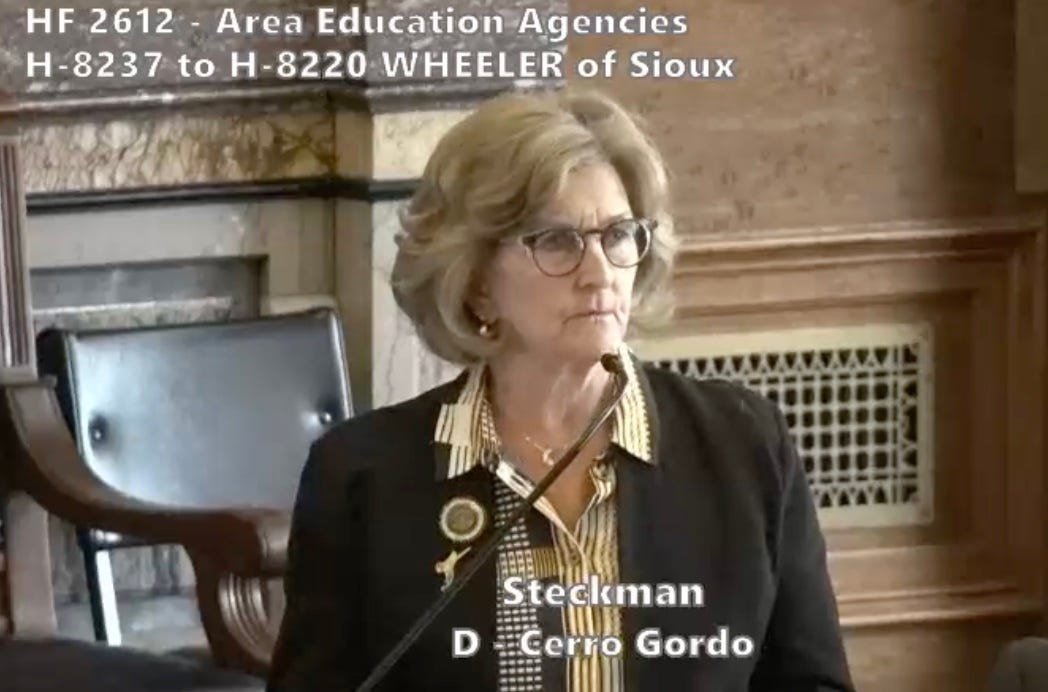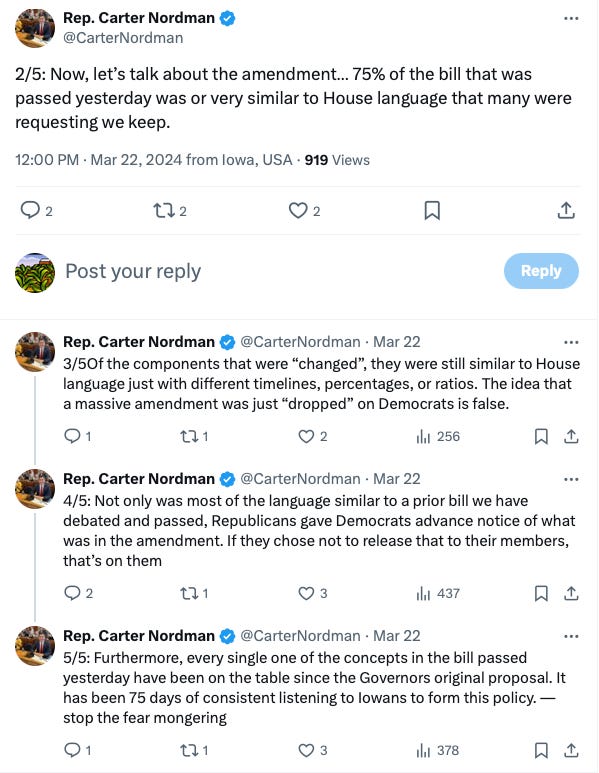"Take time to read this bill": House Dem flagged AEA funding "oversight"
Republicans were warned

Barely a week after Governor Kim Reynolds signed an overhaul of Iowa’s Area Education Agencies, House Republicans are looking for ways to change the law’s provisions on media and education services funding, State Representative Brent Siegrist confirmed on April 4.
Siegrist was among the House Republicans who worked closely on House File 2612, having previously served as executive director of the AEA system. He described the language giving school districts the ability to divert funding from media and education services as “just an oversight.”
He and his colleagues should have listened more carefully during the March 21 debate. Democratic State Representative Sharon Steckman flagged this very problem, despite having little time to review the 49-page amendment Republicans rushed to pass.
A $68 MILLION QUESTION
The bill Reynolds signed on March 27 requires school districts to continue to spend all of their special education funds with AEAs in the coming school year (fiscal year 2025), and 90 percent of special education funds with AEAs in subsequent years.
But school districts will soon gain total control over other funds now earmarked for the AEAs. The law stipulates that school districts will receive 60 percent of media and education services funding for FY2025, while just 40 percent would be guaranteed to flow to the AEAs. Beginning in July 2025, school districts will receive 100 percent of funds for media and education services.
Media services include assistive technology for special needs children, printing, digital resources, and lending libraries. Educational services encompass many kinds of support for teachers, such as professional development and instruction on literacy, math, science, and talented and gifted students.
According to the nonpartisan Legislative Services Agency, Iowa’s funding formula allocates $32.3 million for media services and $35.7 million for education services each year. During the coming fiscal year, the AEAs will be guaranteed 40 percent of that total ($12.9 million for media and $14.3 million for education services). But in year two and beyond, the entire $68 million for media and education services will go to the school districts.
Speaking to the Des Moines Register and Bleeding Heartland on April 4, Siegrist noted that the original House bill required school districts to continue to use those funds for media and education services, though they wouldn’t have to contract with the AEA. (The relevant language is on pages 19 and 20 of the version of House File 2612 that Republicans approved on February 29.) Siegrist said, “The AEAs don’t love that, but they’re willing to compete.”
In contrast, the final version of the AEA bill states on pages 28 and 29, “funds not required to be paid to an area education agency may be used by the school district for any school district general fund purpose.” Because that “could have a more negative impact” on AEAs, Siegrist said House Republicans plan to amend another bill to restore “the original language.”
Rumors about a drafting error or misunderstanding related to media and education services began to circulate soon after the House approved the final version of the AEA bill on March 21. State Representative Skyler Wheeler, who floor managed the bill and led House Republicans in negotiating the AEA compromise, did not respond to Bleeding Heartland’s earlier inquiries about the matter. Neither did House GOP communications staffer Melissa Saitz.
House Republicans should not have been surprised by any part of the lengthy amendment they introduced a few hours before final passage.
This “oversight” is particularly egregious, since the ranking Democrat on the House Education Committee highlighted the relevant language during floor debate.
“TAKE TIME TO READ THIS BILL”
Steckman, a retired teacher, rose to speak against the AEA bill twice on March 21. I pulled this clip from the official video, several minutes before Republicans cut off debate.
Steckman directed colleagues to page 30, line 32 of the House amendment, and read this part of the text out loud: “may be used by the school district for any school district general fund purpose.” She went on:
Media services deliver a lot of the special ed services to our families. So if AEAs have no idea what money they’re going to have coming in, how are they going to afford to buy those services?
It’s 60/40 at first. Then it turns into 100 percent. School districts get 100 percent of that money. They can spend it any way they want.
Another part of House File 2612 calls for a 2.5 percent increase in state aid per pupil for K-12 public schools, a level too low to keep up with rising costs.
For that reason, Steckman said, “if I were a superintendent, I’d give my staff a raise. I wouldn’t spend it with the AEAs, I’d use it to give my staff a raise, because I’m woefully underfunded by us.”
A short while later, Steckman returned to that point.
She asked those who think the bill won’t harm AEAs to “take a second look. Take time to read this bill, because it is going to do harm.”
Without a firm budget to plan on, “how are you going to survive? How are the AEAs going to know what money they’ll have” for education services, crisis intervention, English language learning, and gifted and talented development? If school districts gain the ability to use media and education services funding for general expenses, “our AEAs will have no budget to go on.”
Asked on April 4 why House leaders didn’t pull the bill following Steckman’s remarks so they could fix the amendment, Siegrist said, “We were going to pass it that day. I can’t answer that question. I’m not that person.” He added, “It happens once in a while, we’re going to correct it elsewhere […] I’m going to push very hard to make sure we make that change.”
That could be a heavy lift.
GOVERNOR UNLIKELY TO AGREE TO FIX
Reynolds’ original proposal would have restricted the AEAs to providing only special education services. The bill her office introduced on January 10 would have eliminated code sections that established any funding for media and education services. House Republicans declined to move that bill out of subcommittee.
Siegrist pointed out that under the final AEA bill, the $68 million is “still at least in education now,” even if districts end up using their media and education services funding to cover other costs.
The governor seems happy with that flexibility. Stephen Gruber-Miller reported for the Des Moines Register on April 4,
Speaking to reporters Wednesday [April 3], Reynolds raised the possibility of schools using the money to increase teacher salaries if they need additional funding beyond the new money included in the law.
“Some of the media service dollars that they will now be retaining and some of the educational service dollars, if they want to use those for salaries they can do that, too,” she said.
One wonders whether the governor’s staff slipped one by House Republicans when they were hashing out the AEA deal.
Saitz confirmed to the Des Moines Register that House Republicans are working on language to address this concern, “but it’s not clear that it will have support in the Senate or Governor’s office.” Iowa Senate Republicans favored an approach closer to the governor’s, directing more funds to school districts and guaranteeing far less money would remain with AEAs.
It’s not unusual for Iowa lawmakers to use another bill to address an unintended consequence from legislation approved earlier in the session. The so-called “standings” bill, which is typically one of the last appropriations bills passed before lawmakers adjourn for the year, can be a vehicle for fixing mistakes.
One wrinkle: Iowa’s governor has item veto power over appropriations bills. So Reynolds could strike language related to media or education services funding if it reaches her desk as part of a spending bill.
Asked about that prospect, Siegrist acknowledged the possibility and said Republicans have also been looking for “policy bills that have to pass,” which could incorporate AEA language. He indicated this issue would be “a sticking point” in negotiations. “We intend to correct what we think was an oversight.”
Good luck with that.
REPUBLICANS DENIED “THE PROCESS WAS RUSHED”
House Republicans should never have voted on the AEA bill before stakeholders had time to digest and provide feedback on the last-minute amendment. As many Democrats pointed out during the March 21 debate, there was no legislative deadline to meet. Yet the House cut off debate at 6:30 pm on a complicated text first shared with Democrats around 1:25 pm and not published online until 3:55 pm.
It appears that House leaders didn’t want members to go home for the weekend and be talked out of supporting the unpopular AEA bill. (The thousands of Iowans who contacted legislators about the issue this year overwhelmingly urged them not to make big changes to the system.) Leaders had no votes to spare; the final bill passed by 51 votes to 43, with nine Republicans joining all Democrats in opposition.
In the aftermath of the House vote, some Republicans dismissed Democratic complaints about the process. House Speaker Pat Grassley wrote in his March 22 newsletter:
I know the Democrats are trying to say that the process was rushed because of the timeline of debate yesterday. Let me assure you – we have discussed these policies extensively with Iowans, educators, and as a caucus. There wasn’t anything in the final amendment that hadn’t been debated previously in the Legislature. We took a lot of feedback from Iowans in our crafting of this final package. We heard from parents, teachers, superintendents, the AEAs, the Department of Education and more.
Others took to social media with similar talking points. Here’s State Representative Carter Nordman, bragging that the final bill was “very similar to House language”:
Was the language really “similar to a prior bill we have debated and passed”? Or did most House Republicans fall in line without carefully reading what they were voting on, and without listening to a colleague who told them exactly where to look?
The irony is, even with no opportunity to help draft the amendment and little time to review it before floor debate, House Democrats had a better grasp of the bill’s impact than GOP lawmakers who had hours to discuss the proposal in caucus. Unfortunately, AEAs and the Iowans they serve will pay the price for Republicans’ lack of due diligence.
To make a one-time or recurring gift using a credit card, click here. Bleeding Heartland also has accounts on Venmo, PayPal, and Patreon. To donate via personal check made out to Bleeding Heartland, LLC, please contact me for the best mailing address: laurabelin@substack.com.





Wow.
This bill is criminal. Kiddos will loose services and parents should be worried. While there should be give and take in the political process, the kiddos are the losers in this process.